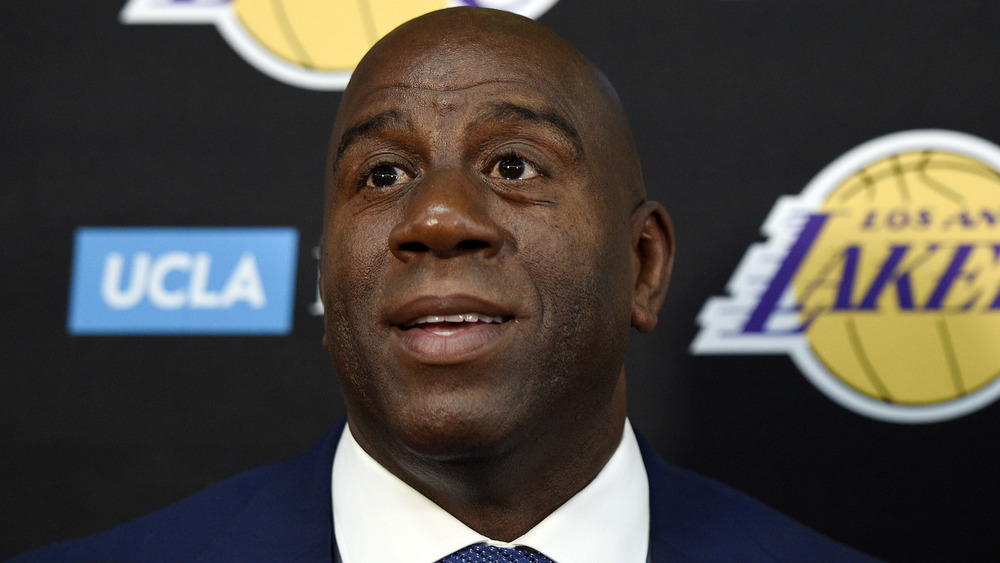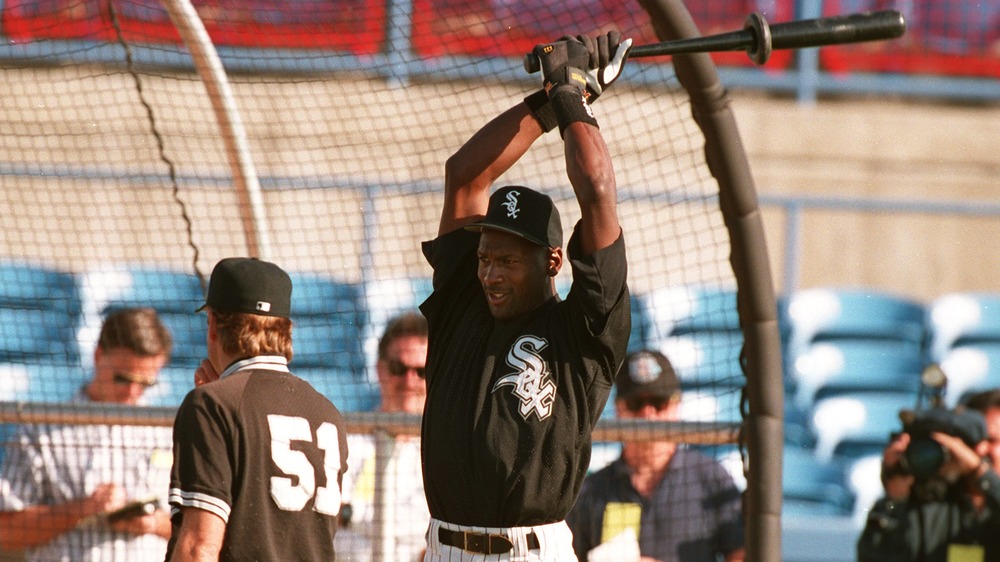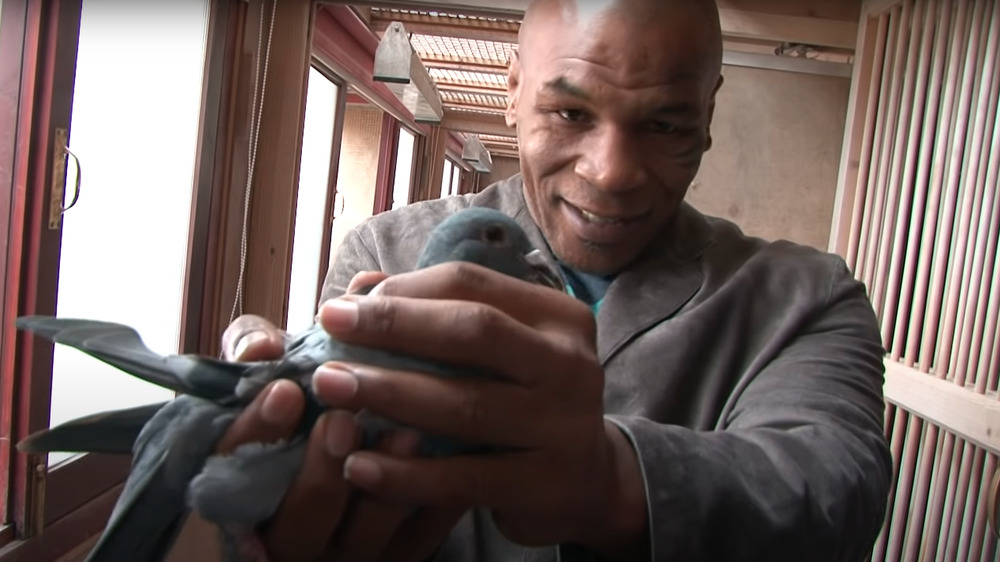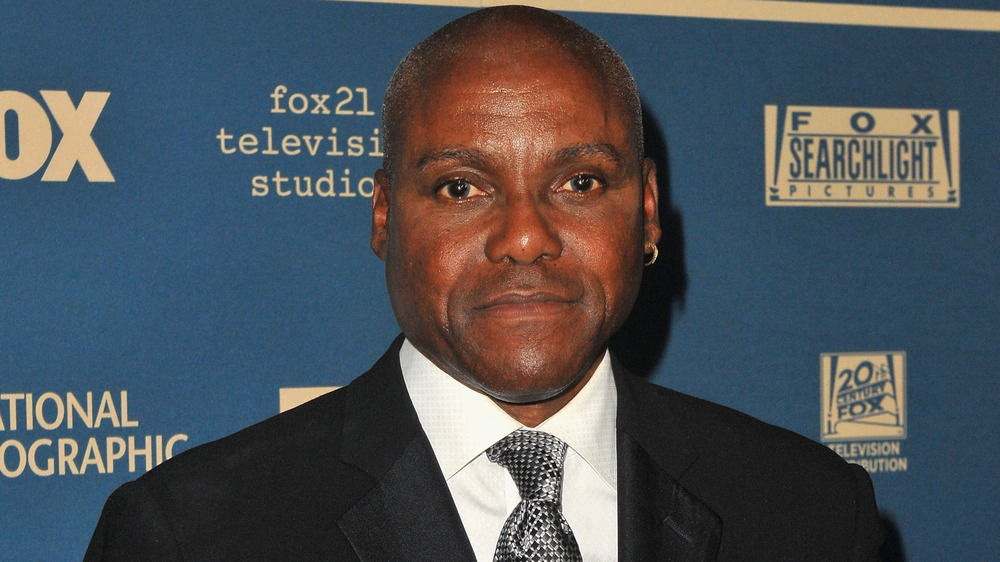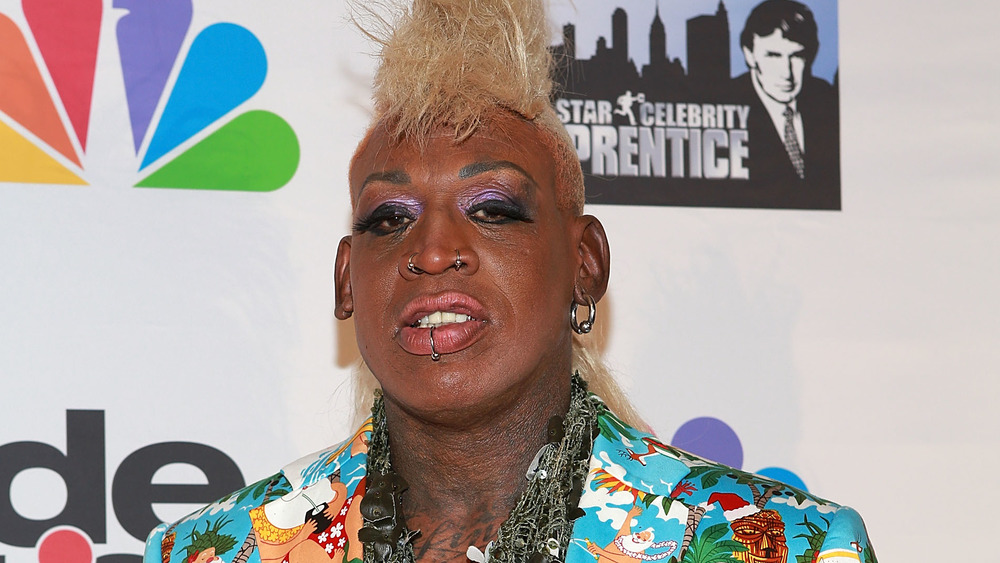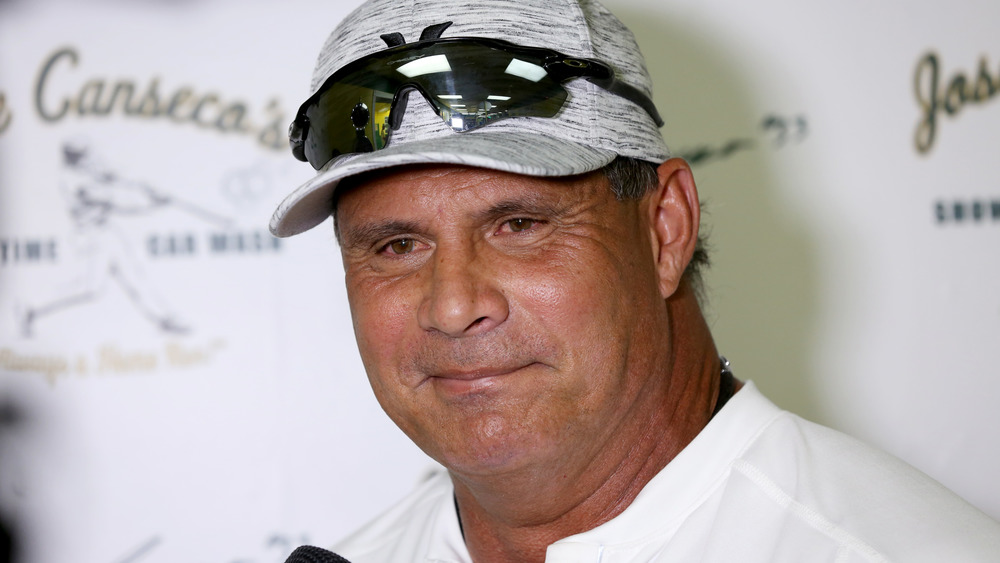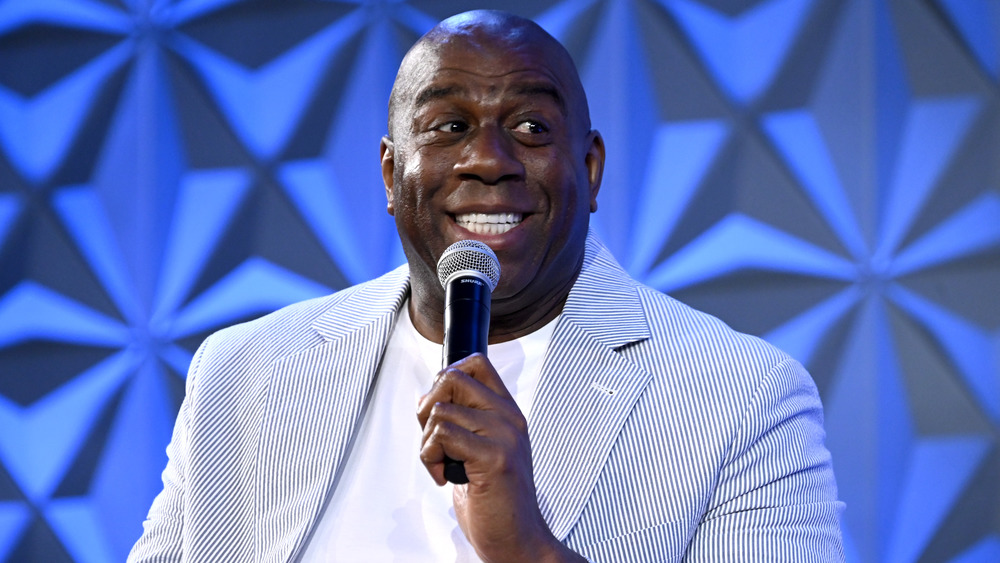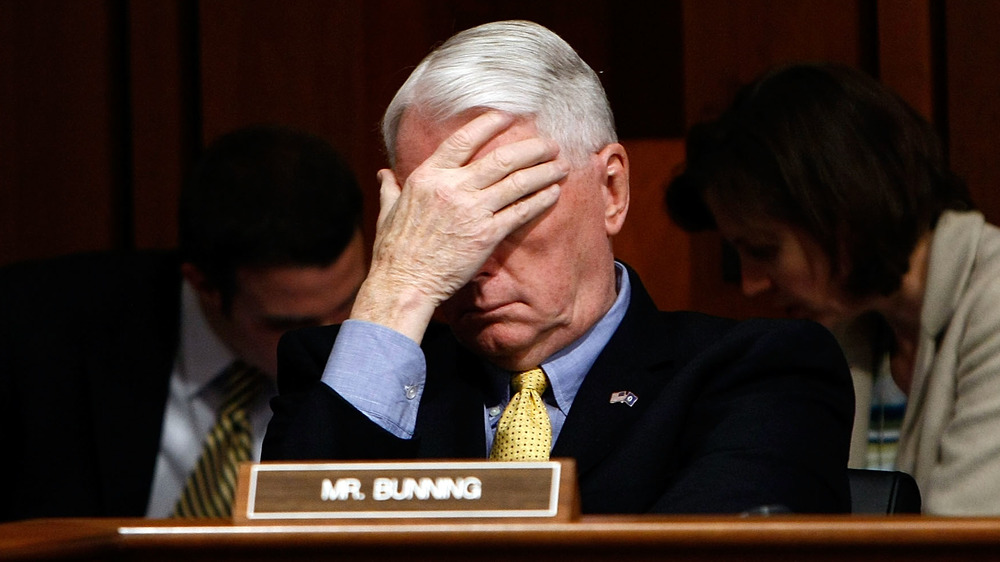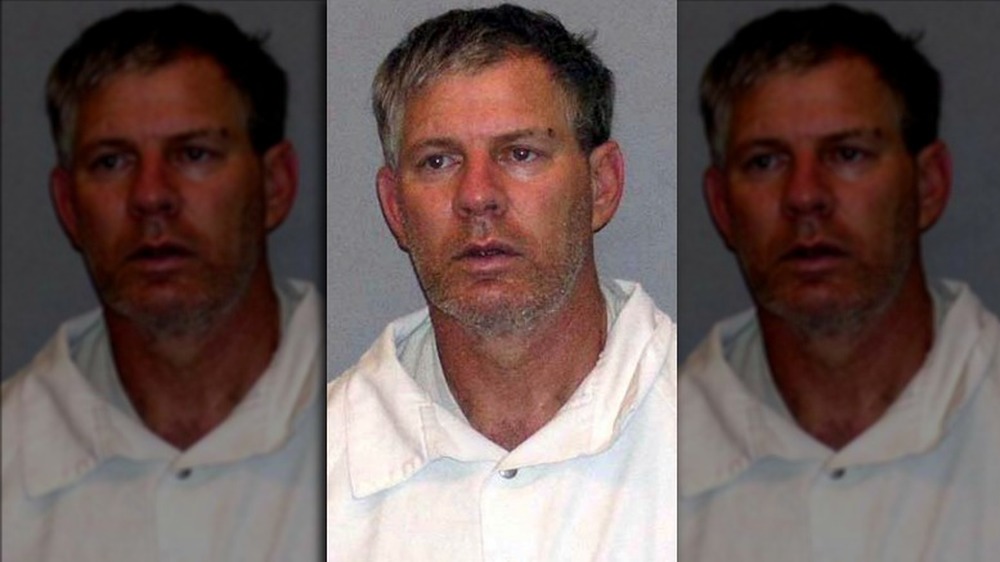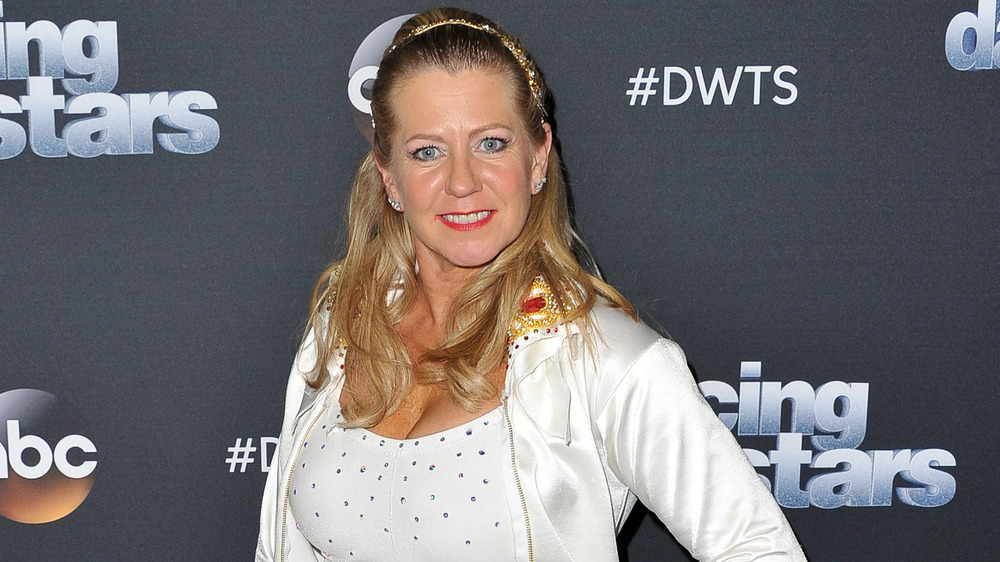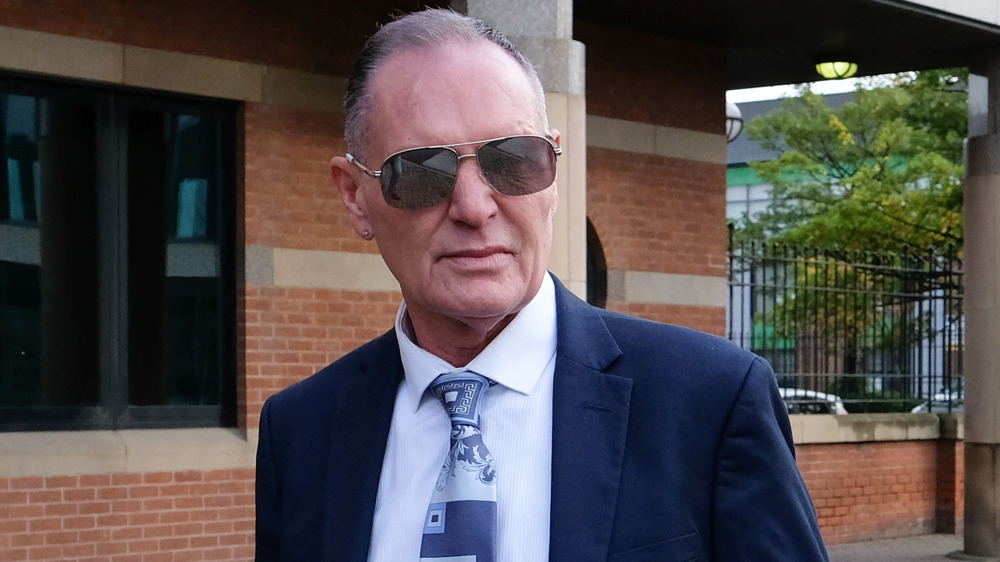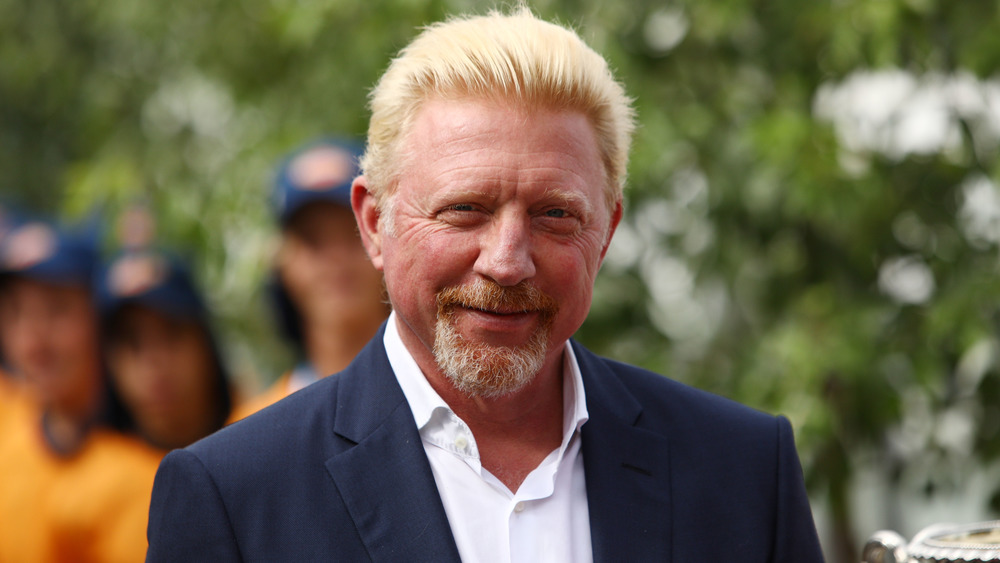The Worst Post-Retirement Career Moves For Famous Athletes
Sports stars are some of the most notoriously well-paid people in the world to the point that their paychecks are almost unfathomable. Just look at Forbes' list of highest-paid athletes. In the year spanning May 2019 to May 2020, Roger Federer led the list, having raked in $106.3 million. Both Cristiano Ronaldo and Lionel Messi fell just short of first place with a combined $209 million — and that comes after suffering a $28 million salary drop as European soccer clubs paused their seasons in March. Still, that gravy train doesn't last forever. While most people couldn't spend eight figure salaries — much less nine figure salaries — in their lifetimes, athletes who win big also spend big. That often leads to some squandered fortunes and particularly embarrassing post-retirement career choices.
Whether they were trying on a brand new passion or panicking under the weight of colossal debt, these pro athletes have made the absolute worst post-retirement career moves. To a galaxy far enough away to film Space Jam and beyond!
Were Michael Jordan's retirement moves unfairly dragged?
Legendary baller Michael Jordan temporarily retired twice from the Chicago Bulls — in 1993 and 1999 — before calling it quits for real in 2003. With all these retirements came post-retirement careers that some could consider a mid-life crisis — but were Jordan's moves secretly genius?
Okay fine, it's hard to make the case that a transition from sports superstardom to starring in a comically bad PG movie was the right move. And yet, Michael Jordan's effort in Space Jam has somehow held up. In spite of a slew of poor reviews, Space Jam is largely considered a '90s classic. Vox even went as far as calling it "kind of visionary."
SI's Tom Verducci makes a similar argument about Jordan's other sports career. Prior to shooting hoops with the Looney Tunes, the NBA star spent 13 months playing minor league baseball with the Double A Birmingham Barons. On the surface, His Airness' merits were few; he had a low batting average and reportedly "didn't know which base to throw to." Verducci claims that in hindsight, however, it's easy to see that Jordan was steadily improving, "grinding at the game, making adjustments and accumulating wisdom with every failure." Then came the infamous MLB Strike of 1994-1995. For 232 days, players and owners clashed over the league's salary cap. Jordan refused to cross the picket line and become a replacement player, eventually leaving baseball and returning to the Bulls. Verducci's conclusion? "Insufficient skills did not stop Michael Jordan's baseball career. The strike did."
Mike Tyson's pigeon racing career cost him plenty
Though Mike Tyson earned hundreds of millions throughout his career, the once youngest heavyweight champion in history famously "squandered his fortune on jewelry, [sex workers], mansions and cars" before filing for bankruptcy, according to CNN Business. This included the $1.3 million Ohio mansion that he was forced to sell and his pigeon collection, which sparked an unlikely career that spiraled him deeper into debt.
According to the Los Angeles Times, Tyson was a child when he started raising pigeons to escape from his rough Brooklyn upbringing. Actually, he told The New York Times that the birds got him into fighting in the first place. A bully killed one of his beloved pets, and he "snapped." It sparked a lifelong desire to nurture the "fighter within," which seemingly peaked when he famously bit off a chunk of Evander Holyfield's ear. Post retirement, the star's pigeons brought him peace, and he began competitively racing them.
In 2011, Tyson's newfound career was documented for Animal Planet's Taking on Tyson. He told the Los Angeles Times that the sport was just as "competitive and intense as boxing." Unfortunately, it's not cheap. It's unclear how much Tyson spent over the course of his pigeon career, but estimates point to thousands. According to The Local, just three of Tyson's racing pigeons cost €15,000 (about $17,776 USD), but he doesn't seem to sweat the major price tag. "Make a pigeon your friend and you'll never be lonely," he told The Times.
Carl Lewis' retirement into showbiz led to ridicule
Nine-time Olympic gold medalist Carl Lewis retired from the track in 1997 and jumped into showbiz. The star was still competing when he embarked on a singing career that became almost as infamous as Shaq's brief stint as a rapper. According to Athletics Weekly, Lewis recorded an album in 1985 that he admitted "wasn't bad ... it just wasn't good." His notorious attempt to sing the national anthem before a 1993 NBA finals game may have been even worse. It cemented him in shame among the ranks of terrible star-spangled singers like Roseanne Barr, who almost derailed her comedy career after grabbing her crotch while singing the anthem in 1990.
Post retirement, Lewis had what can only be described as a failed acting career. If he weren't already a famous athlete, he'd probably still be waiting tables looking for his next gig. His highlights included a part in 2003's Alien Hunter, which didn't even warrant a Rotten Tomatoes rating, and 2007's Tournament of Dreams, which didn't warrant a critical rating either but hit cult status with a 100% audience score.
After that, Lewis tried to pull an Arnold Schwarzenegger and parlay his public notoriety into a political career. According to Athletics Weekly, he ran for the state Senate in New Jersey but was "forced to withdraw" because he "spent more time in California" than in the Garden State. Lewis reportedly told a Houston daily that he only ran because he was "bored." You truly can't win them all.
Dennis Rodman's post-NBA diplomatic foibles
Since retiring from the NBA in 2000, Dennis Rodman has taken on an unlikely political career. How much of that is actually paid is yet to be seen. It all began when the former Chicago Bull formed an unlikely friendship with North Korean dictator Kim Jong Un. Of all people to be friends with, right?
According to The Washington Post, Rodman first flew to the authoritarian state to meet "Dear Leader" in 2013. The dictator is reportedly a big fan of the '90s Chicago Bulls, as are most millennials who grew up watching the sport. Following the trip to Pyongyang, the former NBA star claimed Jong Un was his "friend for life" but refused to accept the title of diplomat. He changed his tune during the Trump administration as tensions rose, most evident by the politicians' public button measuring contest in 2018.
In 2019, Rodman took it upon himself to help mediate Trump's second summit with Kim in Vietnam — or at least offered help. In a Twitter letter reposted "From The Desk Of Dennis K. Rodman," the star dubbed himself the "Ambassador of Goodwill to North Korea" and urged Trump to use his "continued friendship" with Kim for "our Nation's benefit." According to The New York Times, that meeting re-opened the discussion of a new nuclear deal, which ultimately wasn't very fruitful as North Korea later promised to increase its nuclear capabilities in 2020. If only Trump had listened to "Ambassador" Rodman.
Nobody likes a snitch, Jose Canseco
Jose Canseco had a valiant career in the MLB playing with teams like the Oakland Athletics, Chicago White Sox, and Texas Rangers, but much like the rainbow-haired Soundcloud rapper Takashi 6ix9ine, the outfielder managed to cultivate a post-retirement legacy as the kind of dude Snoop Dogg would post memes about. This only came after the star attempted to become an author and ultimately just became a snitch.
According to ESPN, Canseco "retired in 2002 with 462 career home runs," but completely sold out his MLB peers in 2005 when he released his book Juiced, which focused largely on alleged steroid use within the league. Most notably, the former player claimed Mark McGwire, Rafael Palmeiro, and Sammy Sosa used steroids, forcing them to address the claims in a congressional hearing later that year alongside Canseco. McGwire and Palmeiro's careers were irreparably damaged. Palmeiro even tried to initially deny using performance enhancers but was suspended when he tested positive.
Today, Canseco regrets ratting out his bash brother, even if he was talking about their shared drug usage. In the A&E documentary Jose Canseco: The Last Shot (via ESPN), he revealed that he "never realized" his claims would "blow up," but he "wanted revenge" after feeling like the MLB ousted him. "If I could meet with Mark McGwire and these players, I definitely would apologize to them," he said (via The New York Daily News). "They were my friends. I admired them. I respected them."
Magic Johnson's lackluster late night show
Magic Johnson's post-retirement careers have largely been successful. After winning five NBA titles with the Los Angeles Lakers in the '80s, the basketball star launched Magic Johnson Enterprises. According to Forbes (via THR), the company — which included a chain of movie theaters called Magic Johnson Theaters — was valued at $500 million in 2009. He was even considering buying the Los Angeles Dodgers, but instead jumped into the world of late night talk shows, and let's be honest, the dude is no David Letterman.
Per THR, which claimed the show lacked "the spark of spontaneity and sharp conversation" in its own review, the 1998 talk show actually started strong, beating out the ratings of The Late Show With David Letterman in New York. The reign was short-lived, and critics slammed Johnson for his notably poor interview skills. According to Vulture, the former NBA star even needed speech coaches to teach him how to "relax on the couch and at the mic."
The whole thing culminated in an eviscerating interview with Howard Stern, who Vulture claims attacked Johnson's talk show personality, personal life, and HIV battle. The magazine dubbed the incident one of "late night's most bizarre train wrecks, an experiment in social awareness that all but revealed every one of The Magic Hour's weaknesses: Magic's inability to connect with his guests and his audience." Scathing. The series lasted just one season.
Jim Bunning's retirement political career was a strike out
Jim Bunning once threw a perfect game, and after 17 seasons largely with the Detroit Tigers and Philadelphia Phillies, the MLB star cemented his position in the Baseball Hall of Fame. Unfortunately, his legacy as a legendary pitcher was tarnished by his post-retirement career as a politician. Even in his obituary, The New York Times referred to the Republican as little more than "blunt-spoken," "cantankerous," and nationally notorious "for some strange remarks."
According to The New York Times, Bunning served as minority leader in the Kentucky State Senate before joining the House of Representatives in 1987. There, he served for six terms before being elected into the Senate in 1998 and again in 2004. To this day, he's the only Baseball Hall of Famer to serve in Congress but is better known for his outbursts than his actual politics.
According to Wave3 News, the senator had to issue a public apology in 2004 after likening his democratic opponent, Sen. Daniel Mongiardo, to one of Saddam Hussein's sons. Bunning was so markedly volatile throughout his career — with antics extending to things like flipping the bird to reporters — that during his final term, Facing South questioned whether he was the "meanest" senator of the bunch. Moreover, in 2006, TIME listed him as "one of America's worst senators." Now's a nice time to insert that Simpson's meme of an old man yelling at a cloud.
Don't hate the player, hate the game
Lenny Dykstra, who had a legendary career with the New York Mets and Philadelphia Phillies, once owned Wayne Gretzy's 13,000-square-foot mansion, but the mighty fall when they make poor financial decisions. According to Reuters, Dykstra lost his $15 million home after declaring bankruptcy, and left it in such a state of utter disrepair that it was nearly "deemed a biological hazard" because raw sewage was seeping from the home's main drain line. So how did things get so bad? Dykstra tried to get into publishing.
According to a GQ report, Dykstra's post-retirement business, The Players Club, was a colossal failure. The MLB star attempted to wrap a magazine, charter jet service, and brokerage-slash-investment service into one business that was aimed purely at professional athletes. That's not really a huge demographic, and basically, it went down like you'd expect: the whole thing imploded because of cash flow problems. Near the end, Dykstra owed a "considerable" amount of back rent on the company's Park Avenue office, the internet and telephone had been shut off, and the staff was publishing from their homes. After that, the former Met was slapped with "roughly a dozen lawsuits," including a lawsuit from the private plane company Halcyon Jets, which was sparked over a $7,000 bounced check, and the magazine's publisher, who claimed Dykstra "refus[ed] to pay printing costs."
According to The New Yorker, the magazine lasted just three issues, and Dykstra subsequently spent two years in prison for bankruptcy fraud.
Tonya Harding's retirement gigs are all over the map
Tonya Harding's ice skating career ended on such a bad note that the questionable career endeavors she pursued in its wake can't possibly hold a candle to that kind of public embarrassment. In July 1994, the athlete was banned from the U.S. Figure Skating Association and stripped of the gold medal she won at the U.S. National Championships for her alleged involvement in an attack on competitor Nancy Kerrigan. Despite adamantly maintaining her innocence, Harding pleaded guilty to conspiracy and landed three years probation.
According to The New York Times, the incident left the star blacklisted to the point that she couldn't even work "as a sanctioned coach." Instead, she channeled her aggression into a boxing career, but not before trying to become a musician with her band the Golden Blades, which was booed off the stage during a hometown gig, according to People.
Harding reemerged into the spotlight in 2002 when she appeared in Fox's Celebrity Boxing, where she fought against Paula Jones, who was best known at the time for levying sexual harassment allegations against Bill Clinton. Vanilla Ice was also somehow involved. Harding subsequently signed a four year professional boxing contract, according to the Midland Daily News, and won some fights despite being booed and vastly criticized. Her career was derailed following a bout of pneumonia, and she just abandoned it altogether. Eventually, Harding hit the end of the D-List celebrity road with a near-win on Dancing With the Stars: Athletes.
From footballer to would-be criminal whisperer
Former Tottenham Hotspur Paul "Gazza" Gascoigne, who "helped England qualify for the 1998 FIFA World Cup" before retiring in 2000 (per the National Football Museum), tried to be just as helpful off the pitch as he was on it. The problem was no one actually asked for that help. In 2010, the soccer star took it upon himself to play therapist for a suicidal killer, who was considered Britain's most wanted man.
According to Mirror, Gazza, then deep in the throes of addiction, snorted 14 lines of cocaine before jumping into a taxi with a "fishing rod, some chicken" and "four cans of lager" in an attempt to assist murderer Raoul Moat, who ran from police after shooting his ex-girlfriend, her new boyfriend, and an officer. Gazza believed a man-to-man fishing trip could sort it out, so he headed to "the police cordon where Moat was surrounded."
"I was telling the taxi driver I could save him. I told him: 'Listen, I have been through so much, I am the best therapist in the world, I can save him,'" Gascoigne, who is not a trained therapist, recalled of the incident to Mirror. The police standoff was happening on live TV when the high profile star unexpectedly showed up to stoke tabloid rumors. In the end, the retired athlete never actually made it to Moat, who ended up committing suicide the following morning, but we're guessing his ersatz therapy skills probably wouldn't have done much good.
Boris Becker, the fake diplomat
German tennis star Boris Becker took on an interesting post-retirement career in order to help him shake his debt. Typically, people will pick up a job — no matter how low paying — and slowly chip away at it over the course of months and years. Becker did not follow this path. Instead, he invented an unpaid job that would grant him legal immunity to court-ordered debt repayment.
According to The Guardian, the former tennis player failed to pay about £3.3 million ($4.32 million USD) when a London court declared him bankrupt in June 2017. The next year, the athlete claimed he had taken a gig as the "Central African Republic's attaché for sports, culture and humanitarian affairs to the European Union." This job was unpaid, as CAR is extraordinarily poor, but it did grant him "diplomatic immunity from his debts" — or so he claimed. At the time, Becker had reportedly never even visited the nation.
As expected, the British government looked into it, and officials from CAR claimed they had "no record of Becker's new job." Per The Guardian, the CAR claimed his alleged "diplomatic passport" was "a fake" with a serial number associated with stolen passports from 2014. Moreover, Becker's legal argument to immunity was further weakened when the passport showed his actual position as "financial charge de mission" rather than an "attaché." Becker eventually gave up the immunity bid and began selling off his trophies to make payments.

